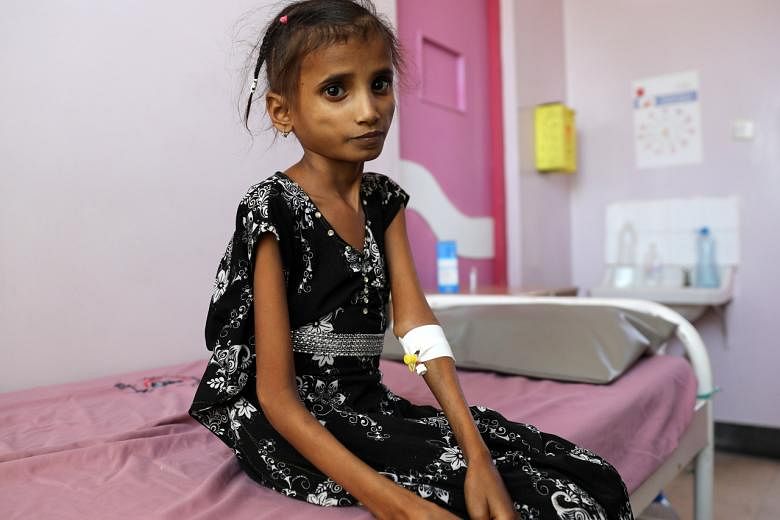SANAA/NEW YORK (REUTERS) - Ahmadiya Juaidi's eyes are wide as she drinks a nutrition shake from a large orange mug, her thin fingers grasping the handle.
Her hair is pulled back and around her neck hangs a silver necklace with a heart and the letter A. Three weeks ago, the 13-year-old weighed just 9kg when she was admitted to al-Sabeen hospital in Yemen's capital Sanaa with malnutrition that sickened her for at least the past four years. Now she weighs 15kg.
"I am afraid when we go back to the countryside, her condition will deteriorate again due to lack of nutritional food. We have no income," her elder brother Muhammad Abdo Taher Shami told Reuters. They are among some 16 million Yemenis - more than half the population of the Arabian Peninsula country - that the United Nations says are going hungry.
Of those, five million are on the brink of famine, UN aid chief Mark Lowcock warns. Next Monday (March 1), the UN hopes to raise some US$3.85 billion (S$5.13 billion) at a virtual pledging event to avert what Mr Lowcock says would be a large-scale "man-made" famine, the worst the world will have seen for decades.
More than six years of war in Yemen - widely seen as a proxy conflict between Saudi Arabia and Iran - have sent the impoverished country spiralling into what the UN describes as the world's largest humanitarian crisis.
Some 80 per cent of Yemenis need help, with 400,000 children under the age of five severely malnourished, according to UN data.
For much of its food, the country relies on imports that have been badly disrupted over the years by all warring parties.
"Before the war, Yemen was a poor country with a malnutrition problem, but it was one which had a functioning economy, a government that provided services to quite a lot of its people, a national infrastructure and an export base," Mr Lowcock told reporters. "The war has largely destroyed all of that."
"In the modern world, famines are basically about people having no income and then other people blocking efforts to help them. That's basically what we've got in Yemen," he added.
Hunger v pandemic
A Saudi Arabia-led military coalition intervened in Yemen in 2015 after the Iran-allied Houthi group ousted the country's government from Sanaa. The Houthis say they are fighting a corrupt system. The people's suffering has been worsened by an economic and currency collapse, and the Covid-19 pandemic.
UN officials are trying to revive peace talks, and new United States President Joe Biden has said Yemen is a priority, declaring a halt to US support for the Saudi-led military campaign and demanding the war "has to end".
Twelve aid groups, including Oxfam, Save the Children and Care International, have warned that 2.3 million children under the age of five in Yemen will go hungry this year if governments do not step up their funding next Monday .
Mr Muhsin Siddiquey, Oxfam's country director in Yemen, recounted a conversation with an 18-year-old woman, displaced by the conflict and living in a camp in northern Yemen.
"She said that the coronavirus pandemic gives us two cruel choices: Either we stay home and we die from hunger, or we go out and then die from the disease," he told Reuters.
Official figures vastly underestimate the spread of Covid-19 in Yemen, according to the UN and aid agencies. In 2018 and 2019, the UN prevented famine due to a well-funded aid appeal, which included large donations from Saudi Arabia, the United Arab Emirates and Kuwait.
In 2020, the UN received only just over half the US$3.4 billion it needed, which Mr Lowcock said was largely due to smaller contributions from Gulf countries. He urged them to pledge generously for 2021 and pay quickly. The United Arab Emirates said on Friday that it would pledge US$230 million for 2021.


